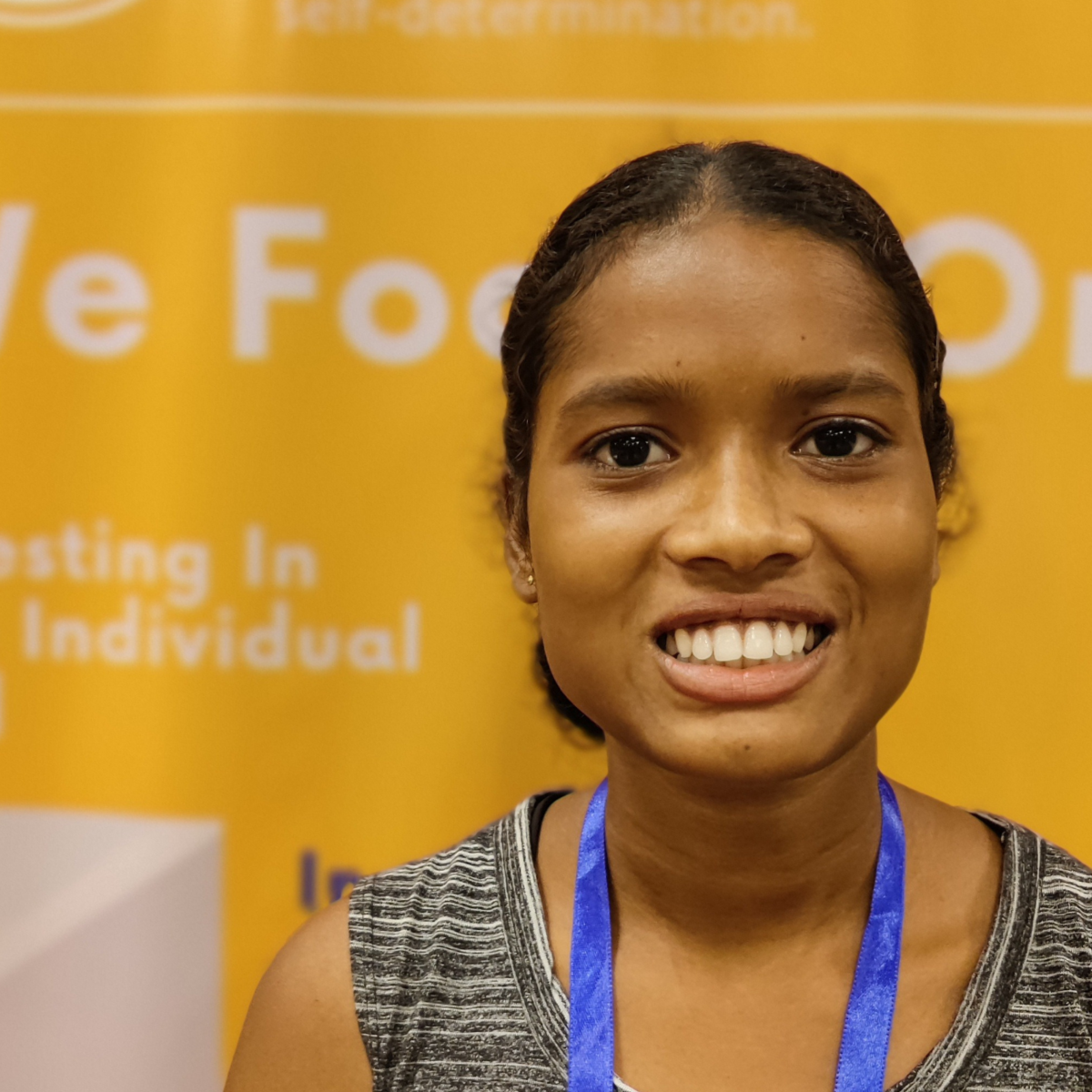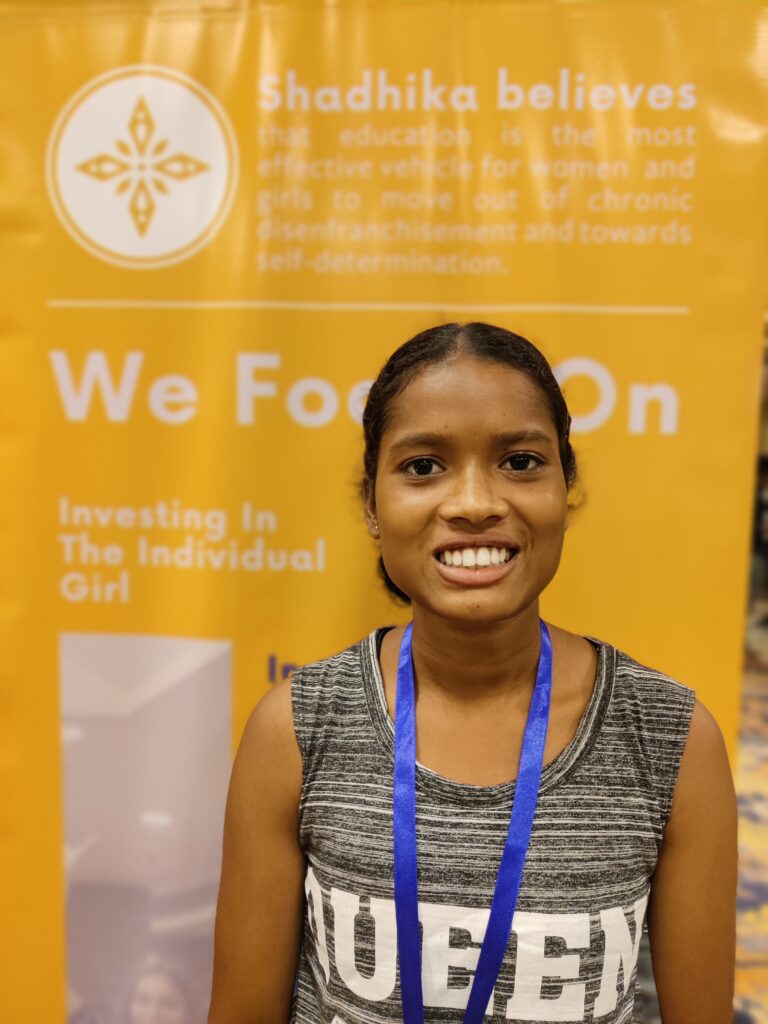
The more someone is oppressed, the more quickly they're pushed to take action, like a volcano.
When She Leads: Bina
By Vanita Ganesh, Communications Officer
July 31, 2023
Reading Time: 7 minutesHi, my name is Bina and I come from West Bengal’s Alipurduar district. My family consists of myself, my mother, and two brothers. One brother had to drop out of school because of an accident, and the younger one is in the 8th class. I’m the eldest of all of us. They are naughty but at the same time very caring. Even though he doesn’t have a leg [sic] (due to the accident), my brother makes food for me when I am sick and helps with housework.
How does it feel to be at the Summit, meeting new people like the Change Leaders and other organizations for the first time?
We’re able to make friends, share numbers and find ways to stay in touch and meet up, and connect with people from different districts and states, from Gujarat to Maharashtra, which wouldn’t have been possible without being a part of Shadhika.
We’re also learning about different cultures and the way people dress up, their food, and how their communities are. We’re learning and also able to teach others about ourselves. I taught some new friends my language (Bengali), specifically how to say ‘I love you’!
What comes to mind when you hear ‘Our Time Is Now’, the theme for this year’s L4C Summit?
I immediately think of ‘Secret Superstar,’a movie where a talented girl wants to sing and study but isn’t able to because her family doesn’t allow it. But her mother supports her, which does create problems with the family. But the more someone is oppressed, the more quickly they’re pushed to take action, like a volcano. They feel like their time is now, they refuse to be pushed down anymore.
Could you share an instance from your own life and community, of someone being pushed down and not allowed to study, but they have fought back?
Society always believes that no matter how educated a girl is, ultimately she has to cook and care for the family. This is a belief that has always been in people’s minds. But this belief isn’t true, we have so many options to explore [such as] medicine and nursing, defense services, teaching, and more. If we study hard and get a good job, we can afford a support system and not compromise our careers.
If we come in with the belief that women and girls’ only purpose is in the kitchen, then somehow it also affects the thinking of young girls:”What is the point of studying when I only have to be in the kitchen?” Change has to start from within so that people watching are also affected and learn to do better.

Rightly said. People continue to say “What will you do as a woman or a girl, how can you lead?” What is something that you would like to say to them about girl leadership?
I would like to take my own example to talk about girl leadership. At Jabala, we got training to paint walls, add putty, and maintain it; something that usually only boys do. While painting walls is great, getting to work on plastering and adding putty to walls is better as a part-time job since we get to work in more houses. Three of us girls would go with a big ladder, and turn a run-down wall into something beautiful. Other boys would see us and be proud! We, in fact, repaired and maintained the front wall in my uncle’s house. I also repaired the roof of my own house and I have also worked at a ration shop.
At the ration shop, I would have to go to get products that got over. People would ask if I was working at the shop, and seeing my work there changed their mindsets in a jiffy! They would ask me to recommend other girls to work in their own shops when they can easily hire more boys. I felt proud hearing them ask this, and at the fact that the ration shopkeeper still asks me to come back and take care of the accounts management.
So what are you studying right now and why?
Currently, I am in my first year of a BA General (Arts) degree. My favorite subject is history as we have a good teacher. Studying kingdoms, their governance, their culture, and how they would live and treat people then is very interesting. We learn so much from history and past deeds, and for me, it is an opportunity to learn about past mistakes and how we can avoid them.
Prior to becoming a Shadhika Scholar, what did you find was your biggest challenge with being able to complete your studies or go to school? How has this changed since becoming a Scholar?
My mother would never stop me from studying. She would tell me: “Study how much ever you can and want to, and I will try [my best] to support you”. But because of the situation at home, I had to drop out after completing the 10th grade. I would attend vocational and spoken classes where I would get computer training.
After this, I got to know about Jabala and subsequently about Shadhika. Through the Shadhika Scholarship and with Jabala’s support I am continuing my education. Now along with college, I am able to take up part-time jobs to help my home and family.
After joining the Scholarship Program, to date, we do not have to worry about support. We don’t have to worry about our life ending today. There is still so much to look forward to. The mental distress and pressure that comes with worrying about ‘what’s next’ or what tomorrow will bring isn’t there.
We never imagined that we will get to come to a place like this or that we would be able to sit on a flight and travel someday. This makes us feel like there is much to look forward to like there are a lot of good surprises heading our way, and that we can go on our own journeys and work hard. Because it is our time now!
Is there anything you would want to say to the Shadhika community of supporters? What would you say to them about the importance of this program, that they have helped to contribute to, in your life?
There is a girl whose family situation is bad right now. Her parents’ health is not so good, and because of this they don’t work and she had to drop out. I remember I had asked her about her grade 10th exams, and she said that she didn’t know about the exams and ended up missing them because she didn’t have a phone. I tried to arrange help for her. But she had to drop out due to financial trouble and now takes care of the home and chores. Seeing her situation, now I tell people that education is so so important. The more we’re able to study, the better we are able to gauge what direction is best for us.
Most of our homes and situation is such that we aren’t able to pursue education. With the help of the Shadhika Scholarship and Jabala, we’ve been able to explore so many opportunities and options for the future. We are able to find work in the private sector or prepare for the defense services, or even pursue sports. We aren’t limited anymore.
Read more